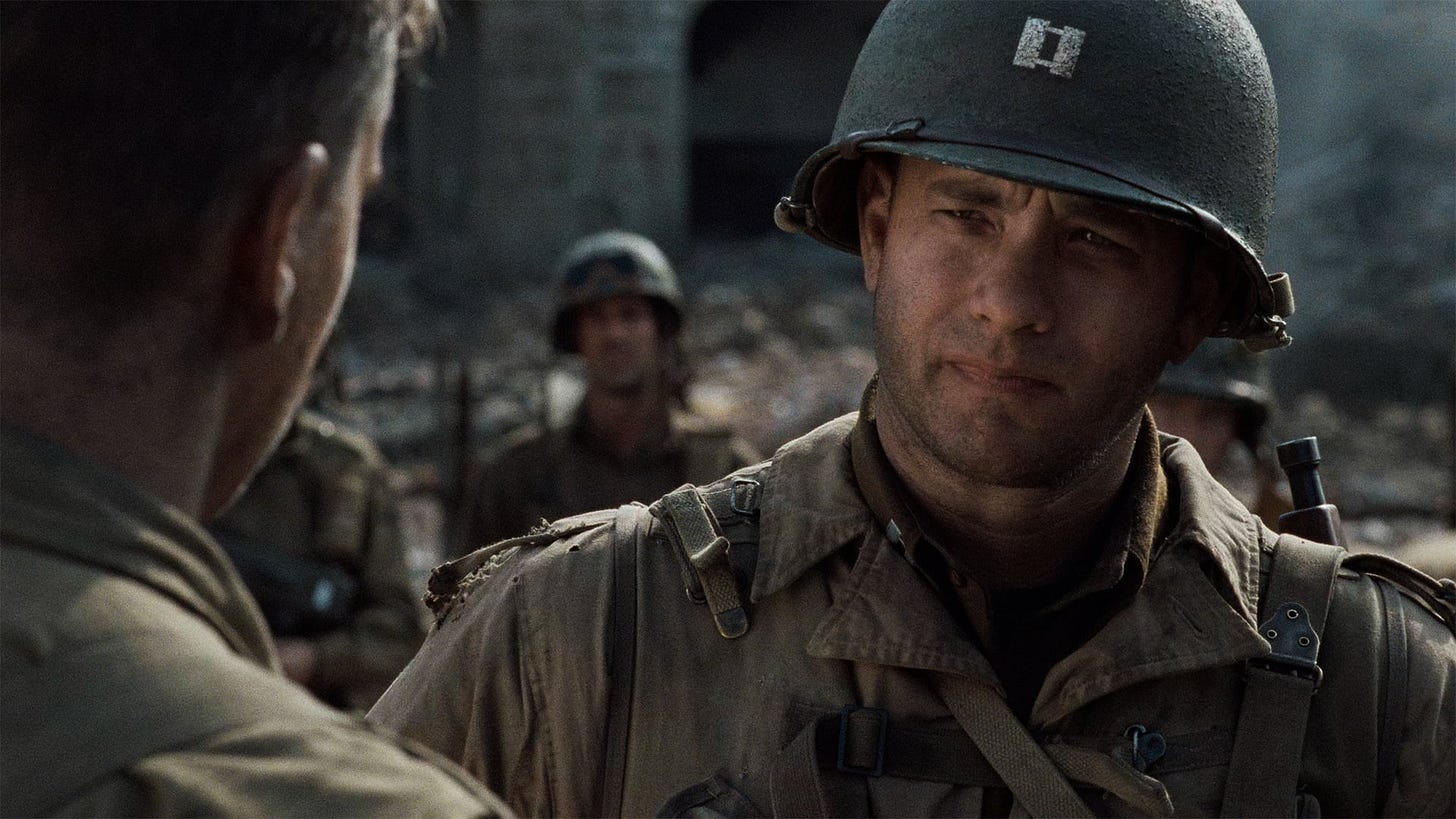Weekly Watches: April 10, 2024
Sharing Our Recent Discoveries: Weekly Watches with 100 Movies Every Catholic Should See
Saving Private Ryan (1998)
By
There's plenty of discourse about whether Saving Private Ryan is anti-war or glorifies war; what director Steven Spielberg is trying to "make" us believe about war. The carnage is here, for sure; lots of it. This war is terrible beyond belief; the men seem to be sent into impossible situations by clueless superiors; they die seemingly pointlessly by the thousands. War is hell.
And yet there is heroism among the chaos, decency in the carnage. These men sacrifice for each other, becoming a true band of brothers knit together not by the ridiculous team-building exercises Cpl. Upham tries to engage but by the carnage itself. Out of the violence and destruction comes a real sort of love, a bond of selfless sacrifice that belies the utter physical evil of the war around them. Every time the squad falls into callousness or cruelty, some event occurs which reminds them of the humanity of those around them, both friend and enemy. There is a human cost here, but also human and indeed superhuman virtue.
And at the end of the day, we are reminded that sometimes we are here to save people. Not to accomplish objectives or push back a faceless enemy, but to comfort a grieving mother and return her son to support her in her old age. Why is Ryan's life worth more than the 8 guys who are sent to find him? The truth is, he's not. But if we admit that, if we start treating our men like numbers rather than brothers, sons, husbands, and fathers, then no matter how many objectives we accomplish, we have lost the war.
The debate over whether Saving Private Ryan is pro- or anti-war will ultimately be forever fruitless, because it is both and neither. It paints a true picture of war, one which those advocates on both political sides will never be able to fully grasp: war is, indeed, hell, and those who choose to unleash it upon the world must carry a great weight on their souls; but sometimes walking through hell can make men into angels.
Angels in the Outfield (1994)
By
Visiting home for Easter break, I unexpectedly had the experience of revisiting a film from the deepest recesses of my childhood memory, Angels in the Outfield. A feel-good family comedy-drama, it’s a tale of conflict and resolution, hurt and healing, disbelief and faith.
It’s also good fun. A failing baseball team receives inspiration from the determined faith of an incredibly young Joseph Gordon-Levitt. The small boy prays for his favorite team, because if his team wins, his family could be together again. Suddenly, he, and only he, sees angels among the disheartened players, leading to a resurgence of morale and heart in the players and fans. It’s a movie that balances heartachingly sweet with slapstick, and the results are both timeless and cheesy in a way only an early 90’s film can be. Featuring extremely young performances by Matthew McConaughey, Adrien Brody, Daniel Glover, and (not so young) Christopher Lloyd, it’s a grand old time at the ballfield, as well as a shockingly delicate and respectful depiction of angelic intervention.
“We are expecting great things from you kid. We'll all be watching, you remember that.”
Zulu (1964)
By
Everyone loves a good underdog story, especially when the events actually happened in real life. Zulu follows a heavily outnumbered British garrison’s thrilling struggle for survival in the defense of the their outpost against the onslaught of thousands of native warriors at the battle of Rorke’s drift during the 1879 Anglo-Zulu war. Notably, it was Michael Caine’s first major role in a film, a performance that would catapult him into stardom for decades to come. I’m a huge fan of historical epics, especially of those produced during the 1950s and 60s, the heyday of the genre. There’s a certain sincerity and romanticism about them which speak to the boyish hearts in all of us. Those acquainted with the works of G.A. Henty will find that the events of Zulu could have easily worked in one of his novels.
Older films set in the colonial period often suffer under postmodern reexamination but Zulu largely maintains its own, offering a respectful and honest look at the customs of the native tribes. With an eye to historical accuracy, Director Cy Endfield shot the film less than one hundred miles from where the actual battle took place, employing a host of native South Africans, many of whom were direct descendants of the tribesmen who were involved in the conflict. Its a thrilling affair with thousands of extras and plenty of British stiff upper lip sprinkled in for good measure. John Barry’s magnificent orchestral score accentuates an already epic the experience. I would highly recommend Zulu to nearly anyone, but especially to those who enjoy military history and tactics.
Brick (2005)
By
Brick is pretty unconventional for a debut film, except for its typical "first film low budget" of a mere $450,000 (this is miniscule in the world of mega-movie budgets), which writer/director Rian Johnson scraped together by asking friends and family for money. What's unconventional about it is that it's a contemporary neo-noir set at a high school and starring (ostensible) high schoolers...but all the characters speak and act as if they were in a 1930s John Huston film. Starring a young Joseph Gordon-Levitt (who would go on to have a role/cameo in every subsequent Johnson film) the film follows Brendan Frye, a loner who prefers to eat lunch at the back of the school and keeps friends to a minimum. The only person he has ever loved is his ex-girlfriend Emily Kostich (Emilie de Ravin of future Lost fame) who he still keeps tabs on but maintains a strict distance. Trouble begins to brew when Emily (or “Em” as she is often referred to) gets herself in the wrong crowd, and from there Brendan finds himself in a web of intrigue, drug deals gone bad, and a vice-principal (the legendary Richard Roundtree in a brief but memorable role) who is breathing down his neck for answers. Rounding out the cast include Noah Segan (another Johnson regular) and Lukas Haas in scene-chewing supporting roles as antagonists for Brendan. If you’re somebody who is at all interested in making films, this is a textbook example of how to make something that stands out for the lowest of price tags.













